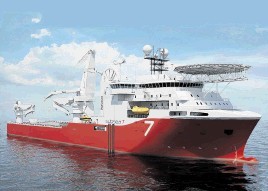
Subsea 7 refused to say yesterday if more jobs will go across its global operations after it revealed 1,000 were shed in 2014.
The energy service giant also outlined plans to reduce its fleet capability by 10 vessels over a two-year period as it continues to look for ways to slash costs in the wake of the big drop in oil prices.
Hefty losses for the firm in 2014 – more than £150million at pre-tax level – were the latest blow for company balance sheets right across the sector as it adjusts to a new trading climate.
Subsea 7 said its latest figures were hit by a £774.4million writedown due to an expected downturn in activity, and without it net profits came in at £525.4million.
But chief executive Jean Cahuzac said 2014 was still a “robust” year for North Sea operations and there was a high level of activity for the firm globally.
“Our strong overall performance…was achieved against a backdrop of a progressive deterioration in business conditions and the environment for our industry continues to be challenging, he added.
He also highlighted a record £917million in earnings before interest, taxation, depreciation and amortisation on revenue up by 9% at £4.5billion.
In addition, he cited a £5.4billion backlog of work at December 31, a “solid base” of projects this year and business activity from 2016 onwards underpinned by long-term day rate contracts.
Mr Cahuzac said the firm moved swiftly last year to prepare for the industry downturn, launching cost-cutting programmes and other efficiency improvements, after noticing a market softening in late 2013.
The belt tightening included the group cancelling its annual Christmas ball– normally held every February – for hundreds of north-east workers.
After starting the year with a global workforce of about 14,000 people, Subsea 7 ended 2014 with 13,000 after 1,000 jobs were axed to save money.
Mr Cahuzac said 500 jobs had gone in Norwegian and Brazilian operations.
But the Oslo-listed firm refuses to give any details of the impact of restructuring on this side of the North Sea, where it has a big presence at Westhill as well as operations in Aberdeen and Wick.
It will not tell the Press and Journal how many people it employs at each of these sites and if any jobs have gone there, or if there are any redundancies planned.
A spokesman said: “The flexibility and mobility of our workforce is its strength and, as such, trying to describe definitive figures for specific locations is a bit specious.
“Our employees move around, occupying different positions in different locations around the world during the course of their careers.”
Chief financial officer Ricardo Rosa said selective headcount reductions were part of the overall cost-cutting strategy.
But he added: “It is important to retain our expertise though the cycle to support continued excellent execution and to position ourselves to win new orders when the market picks up.”
Recommended for you
